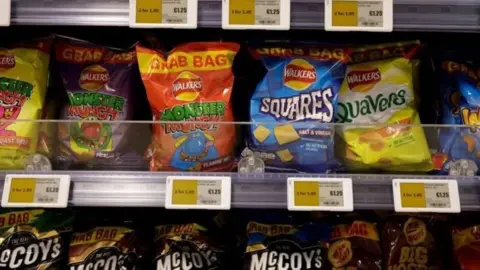 Getty Images
Getty ImagesSupermarkets will be banned from displaying unhealthy snacks near tills or on their website homepages from next year after the Senedd narrowly approved obesity-tackling plans.
The new rules mean junk foods including pizza, chocolate, and cereal will have to be removed from shop entrances and the end of aisles, while sugary drink refills and some buy-one-get-one-free deals will also end.
The restrictions are aimed at stopping impulse buys at key selling spots in businesses with 50 or more employees, with shops found breaching them to face a fine.
Health Secretary Jeremy Miles said the rules, which will come into force in March 2026, would help “tackle Wales’ growing obesity problem”.
Smaller shops and those specialising in one product – such as sweet shops and chocolatiers – will be exempt.
The restrictions form part of a wider programme of measures, including encouraging manufacturers to revise ingredients in other products.
The full list of foods which are “of most concern to childhood obesity”, and therefore will not be allowed in key selling areas, are:
- Soft drinks
- Chocolate
- Sweets
- Cakes
- Ice cream
- Breakfast pastries
- Puddings
- Sweet biscuits
- Cereals
- Yoghurts
- Milk-based drinks with added sugar
- Juice-based drinks with added sugar
- Pizza
- Crisps and savoury snacks
- Ready meals
- Processed meat products such as burgers, chicken nuggets, breaded chicken/fish
- Chips and other potato products
Following a vote on the proposals in the Senedd this week, which saw them just pass by 25 votes to 24, Mr Miles said the move would have “a significant impact on the health of our nation for years to come”.
“We want to make it easier for people to make healthier choices and we’ll achieve this by improving the food environment around them,” he added.
“If we ensure healthier food and drinks are more available, accessible and visible to people in shops and stores, it will support our efforts to reduce obesity rates and improve public health.”
The rules were proposed in a consultation last year and mirror those introduced in England since 2022.

Reacting to the restrictions, Susan Leach, from Rhondda Cynon Taf, described it as a positive outcome.
“I think to have things not on show at the front of the supermarkets is a good thing, to take away temptation for people, and I think we all need to be healthier,” said Ms Leach said.
But Ashley Evans said he disagrees with the outcome, as he says people should be allowed to make their own choices about what they eat.
“It’s all about the nanny state. It’s all about people telling us what we should do and what we shouldn’t do,” said Mr Evans.
“We should make our own choices. We don’t need politicians. We don’t need the Welsh government to tell us what we can eat, what we can’t eat, what we can drink, what we can’t drink, how we should live our lives.
“How are they the moral the moral guardians for wellbeing?”

Dr Julie Bishop, director of health improvement at Public Health Wales said it welcomes the legislation but it is just one step in a “wide range of actions” needed to achieve change.
In a statement, Dr Bishop said diet is rapidly becoming the leading cause of preventable poor health in Wales, which is creating demand on the NHS.
“Our environments shape the choices that we make, and asking people to take more personal responsibility or have more willpower is not the answer,” she said.
“There is significant research evidence to show that the way that food is presented and positioned in shops has an impact on the choices that we make and can make us spend more on things we don’t need.
“This legislation is about giving the customer more choice, it will help level the playing field between the consumer and the retailer.”

James Evans MS, the Welsh Conservatives’ health and social care representative, described the rules as “nanny state nonsense”.
“Keir Starmer promised to ease the cost of living and hasn’t, with Welsh Labour following suit here by pushing up costs for working people,” he said.
“Welsh Conservatives believe in personal responsibility. Efforts to tackle obesity must be focussed on providing support for grassroots sports clubs, increase the amount of sport played in schools, and encouraging more people to get active – not forcibly pushing up the price of the weekly shop.”
Mabon ap Gwynfor, Plaid Cymru’s health representative, warned obesity places “huge pressures” on health and care services, but accused ministers of offering “half a solution”.
“The stick is useful,” he said. “But you need the carrot too. The regulations therefore are entirely inadequate.”
He added there was “little detail on how the policy will be implemented” and said the public would see it as “the government once again preventing people from doing things”.
But Miles hit back at accusations there has been a lack of public engagement, saying the proposals had been subject to two 12-week consultations.
Sioned Quirke, a specialist dietician for the NHS, welcomed the move but described obesity as “extremely complex and multi-faceted”.
“So we need to look at this as one step of a big, big ladder to climb in Wales,” she told BBC Radio Wales Breakfast.
She said consumers had been “conditioned” to buy a sandwich, a bag of crisps and a drink as part of a meal deal, and that it was important “to break that”.
“We need to help people make the healthier choice the cheapest choice, and the easiest choice,” she said.



